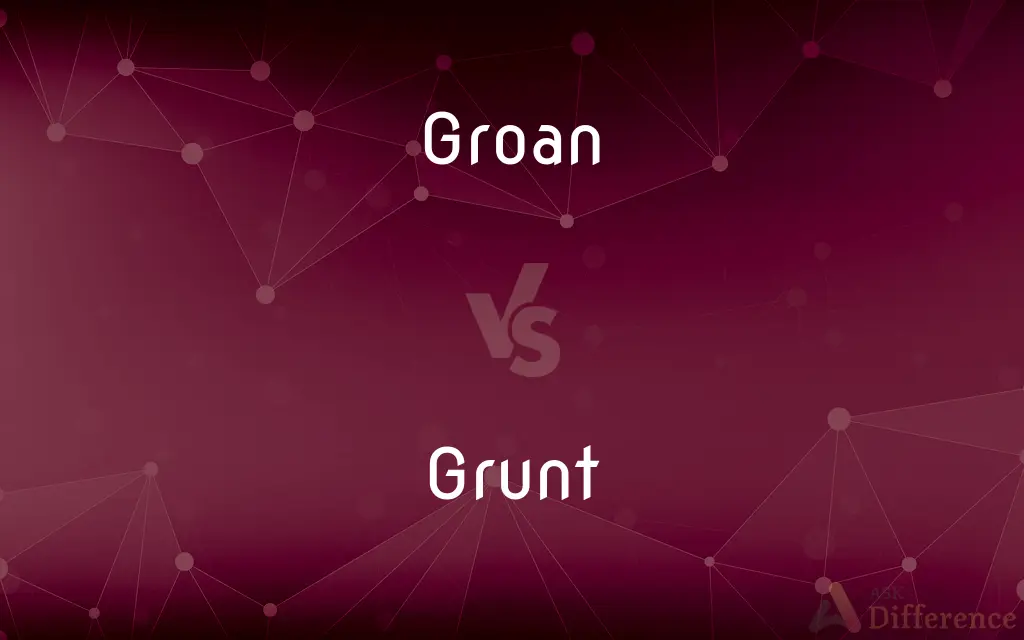Groan vs. Grunt — What's the Difference?
By Tayyaba Rehman — Updated on September 26, 2023
A "groan" is a low, mournful sound made due to pain, sorrow, or desire, while a "grunt" is a short, guttural sound typically expressing effort or exertion.

Difference Between Groan and Grunt
Table of Contents
ADVERTISEMENT
Key Differences
A Groan is usually characterized as a prolonged, deeper, and often involuntary sound emanating from a person due to pain, despair, pleasure, or discomfort. It is generally expressive of some form of distress or another strong emotion and is often louder and more elongated. This sound usually portrays a stronger, more expressive reaction to stimuli. On the contrary, a Grunt is a shorter, more abrupt sound, often produced involuntarily due to exertion, like lifting a heavy object, or as an expression of displeasure or disagreement. It is less expressive and is more restrained in comparison to a groan.
While Groans often symbolize suffering or displeasure, reflecting a range of emotions from pain to annoyance, they are often more audible and may reflect a need or a desire for help or attention. Conversely, Grunt is a sound that is generally less emotional and more functional, often used to communicate minimal acknowledgment or response, and is usually more common during physical exertion or as an informal response.
The context in which Groan and Grunt are used can also be quite distinct. Groans are often associated with negative emotions, discomfort, or desire, and are usually more elongated, allowing for a more expressive conveyance of feeling. In contrast, grunts are usually short, less expressive sounds that are often involuntary reactions to physical effort or strain, sometimes used to convey acknowledgment or dissent without using words.
In summary, the main differences between Groan and Grunt lie in the duration, expressiveness, and contexts in which they are used. A groan is usually longer, more expressive, and more associated with emotional response, while a grunt is short, less expressive, and often relates to physical exertion or minimal verbal acknowledgment.
Comparison Chart
Duration
Longer and more elongated.
Shorter and more abrupt.
ADVERTISEMENT
Expressiveness
More expressive of emotions like pain or desire.
Less expressive, often relating to effort or exertion.
Context
Often associated with negative emotions or discomfort.
Typically associated with physical effort or strain.
Communication Purpose
May convey a need or desire for help or attention.
Often conveys minimal acknowledgment or response.
Sound Characteristics
Deeper, mournful sound.
Short, guttural sound.
Compare with Definitions
Groan
It can symbolize a vocal expression of desire or longing.
He heard a groan of desire escape her when he kissed her.
Grunt
A grunt is a short, low sound typically expressing effort or exertion.
He let out a grunt as he lifted the weights.
Groan
Groan can also mean to complain or grumble about something.
He would often groan about his hectic work schedule.
Grunt
Grunt can represent the characteristic sound made by pigs.
The pig made a grunt as it searched for food.
Groan
A groan is a deep, prolonged sound expressing pain or displeasure.
She let out a groan when she lifted the heavy box.
Grunt
To utter a deep guttural sound, as a hog does.
Groan
It can represent a vocal manifestation of despair or frustration.
A collective groan arose from the audience when the movie stopped abruptly.
Grunt
To utter a sound similar to a grunt, as in disgust.
Groan
Groan might denote the sound of something under strain or pressure.
The old door emitted a groan as it was opened.
Grunt
To utter or express with a deep guttural sound
He merely grunted his approval.
Groan
To voice a deep, inarticulate sound, as of pain, grief, or displeasure.
Grunt
A deep guttural sound.
Groan
To make a sound expressive of stress or strain
Floorboards groaning.
Grunt
Any of various chiefly tropical marine fishes of the family Haemulidae that produce a grunting sound by rubbing together their pharyngeal teeth.
Groan
To utter or express with groans or a groan.
Grunt
(Slang) An infantryman, especially in the US Army or Marine Corps
“No one knows the cost of war better than the grunts” (Nathaniel Fick).
Groan
The sound made in groaning.
Grunt
(Slang) One who performs routine or mundane tasks.
Groan
A low, mournful sound uttered in pain or grief.
Grunt
New England A dessert made by stewing fruit topped with pieces of biscuit dough, which steam as the fruit cooks. Also called slump.
Groan
A low, guttural sound uttered in frustration, disapproval, or ecstasy.
Grunt
A short snorting sound, often to show disapproval, or used as a reply when one is reluctant to speak.
Groan
A low creaking sound from applied pressure or weight.
Grunt
The snorting cry of a pig.
Groan
To make a groan.
We groaned at his awful jokes.
The wooden table groaned under the weight of the banquet.
Grunt
Any fish of the perciform family Haemulidae.
Groan
(figurative) To seemingly creak under the strain of being heavily laden.
Grunt
A person who does ordinary and boring work.
Groan
(obsolete) To strive after earnestly, as if with groans.
Grunt
An infantry soldier.
Groan
To give forth a low, moaning sound in breathing; to utter a groan, as in pain, in sorrow, or in derision; to moan.
For we . . . do groan, being burdened.
He heard the groaning of the oak.
Grunt
(slang) The amount of power of which a vehicle is capable.
Groan
To strive after earnestly, as with groans.
Nothing but holy, pure, and clear,Or that which groaneth to be so.
Grunt
(North American) A dessert of steamed berries and dough, usually blueberries; blueberry grunt.
Groan
To affect by groans.
Grunt
To make a grunt or grunts.
Groan
A low, moaning sound; usually, a deep, mournful sound uttered in pain or great distress; sometimes, an expression of strong disapprobation; as, the remark was received with groans.
Such groans of roaring wind and rain.
The wretched animal heaved forth such groans.
Grunt
To make a grunt or grunts.
Groan
An utterance expressing pain or disapproval
Grunt
To break wind; to fart.
Who just grunted?
Groan
Indicate pain, discomfort, or displeasure;
The students groaned when the professor got out the exam booklets
The ancient door soughed when opened
Grunt
To make a deep, short noise, as a hog; to utter a short groan or a deep guttural sound.
Who would fardels bear,To grunt and sweat under a weary life.
Grunt
A deep, guttural sound, as of a hog.
Grunt
Any one of several species of American food fishes, of the genus Hæmulon, allied to the snappers, as, the black grunt (A. Plumieri), and the redmouth grunt (H. aurolineatus), of the Southern United States; - also applied to allied species of the genera Pomadasys, Orthopristis, and Pristopoma. Called also pigfish, squirrel fish, and grunter; - so called from the noise it makes when taken.
Grunt
A U. S. infantryman; - used especially of those fighting in the war in Vietnam.
Grunt
The short low gruff noise of the kind made by pigs
Grunt
An unskilled or low-ranking soldier or other worker;
Infantrymen in Vietnam were called grunts
He went from grunt to chairman in six years
Grunt
Medium-sized tropical marine food fishes that utter a grunting sound when caught
Grunt
Issue a grunting, low, animal-like noise;
He grunted his reluctant approval
Grunt
It can denote an unarticulated response of acknowledgment.
She responded to his question with a non-committal grunt.
Grunt
It might symbolize a sound indicative of minimal response or effort.
He gave a grunt of approval when he tasted the soup.
Grunt
Grunt can also mean a soldier, especially an infantryman.
The grunts were sent in first during the military operation.
Common Curiosities
Can Grunt be used to acknowledge something?
Yes, grunts can often serve as minimal, non-verbal acknowledgment.
Can Groan be used to express physical discomfort?
Absolutely, groans are often used to express physical pain or discomfort.
Is a Groan longer than a Grunt?
Yes, groans are typically longer and more elongated than grunts.
Share Your Discovery

Previous Comparison
Christianity vs. Metaphysics
Next Comparison
Apposite vs. AppropriateAuthor Spotlight
Written by
Tayyaba RehmanTayyaba Rehman is a distinguished writer, currently serving as a primary contributor to askdifference.com. As a researcher in semantics and etymology, Tayyaba's passion for the complexity of languages and their distinctions has found a perfect home on the platform. Tayyaba delves into the intricacies of language, distinguishing between commonly confused words and phrases, thereby providing clarity for readers worldwide.















































